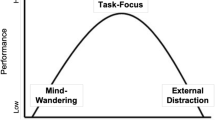Abstract
The studies reported here investigated the role of background music in verbal processing. The experiment was a partial replication of Salame and Baddeley (1989), where the effect of music on the recall of digits, was examined, but included an additional key condition where participants heard instrumental music without the words usually associated with it. In this case we used nursery rhymes. In addition, articulatory suppression was manipulated as a tool to look at the role of working memory in the task. The relationship between long-term memory and working memory was further explored by using an implicit memory task to examine verbal memory effects for words associated with the music but not actually heard. The results indicated that background, instrumental music, long-associated with words, significantly impairs concurrent verbal processing. These long-term memory effects on working memory were, however, not associated with implicit memory effects, and no priming was observed.
Similar content being viewed by others
References
Baddeley, A. (1990).Human Memory: Theory and Practice. London: Erlbaum.
Baddeley, A. (1986).Working Memory. Oxford: Oxford University Press.
Colle, H. and Welsh, A. (1976). Acoustic masking in primary memory.Journal of Verbal Learning and Verbal Behaviour, 15, 17–32.
Daee, S. and Wilding, J. (1977). Effects of high intensity noise on short-term memory for position in a list and sequence.British Journal of Psychology, 68, 335–349.
Davis, D. and Jones, D. (1975). The effects of noise and incentive in short-term memory.British Journal of Psychology, 66, 61–88.
Gardiner, J.M. and Hampton, J.A. (1985). Semantic memory and the generation effect: Save tests of the lexical activation hypothesis.Journal of Experimental Psychology: Learning, Memory and Cognition, 10, 454–464.
Hockey, G. and Hamilton, P. (1970). Arousal and information in short-term memory.Nature, 226, 866–867.
Jaccoby, L.L. (1983). Remembering the data: Analyzing interactive processes in reading.Journal of Verbal Learning and Verbal Behaviour, 22, 485–508.
McClelland, A. and Pring, L. (1991). An investigation of cross-modality effects in implicit and explicit memory.Quarterly Journal of Experimental Psychology, 43A(1), 19–33.
Murray, D. (1965). The effect of white noise upon the recall of vocalized lists.Canadian Journal of Psychology, 19, 333–345.
Rabbit, P. (1968). Channel capacity, intelligibility and immediate memory.Quarterly Journal of Experimental Psychology, 20, 241–248.
Reisberg, D. (1992).Auditory Imagery. Hillsdale, NJ: Erlbaum.
Roediger, H.L. and Blaxton, T.A. (1987). Retrieval modes produce dissociations in memory for surface information. In D.S. Gorfein and R.R. Hoffman (Eds.),Memory and Cognitive Processes: The Ebbinghaus Centennial Conference. Hillsdale, NJ: Erlbaum.
Salame, P. and Baddeley, A. (1982). Disruption of short-term memory by unattended speech: Implications for the structure of working memory.Journal of Verbal Learning and Verbal Behaviour, 21, 150–164.
Salame, P. and Baddeley, A. (1986). Phonological factors in STM: Similarity and the unattended speech effect.Bulletin of the Psychonomic Society, 24, 263–265.
Salame, P. and Baddeley, A. (1987). Noise, unattended speech and short-term memory.Ergonomics, 30, 1185–1193.
Salame, P. and Baddeley, A. (1989). Effects of background music on phonological short-term memory.Quarterly Journal of Experimental Psychology, 41A, 107–122.
Wilding, R., Mohindra, N. and Breen-Lewis. (1986). Noise effects in free recall with different orienting tasks.British Journal of Psychology, 73, 479–486.
Wilkinson, R.T. (1975). Noise effects in free recall with different orienting tasks. Paper presented at the annual meeting of the American Psychological Association, Chicago.
Author information
Authors and Affiliations
Rights and permissions
About this article
Cite this article
Pring, L., Walker, J. The effects of unvocalized music on short-term memory. Current Psychology 13, 165–171 (1994). https://doi.org/10.1007/BF02686799
Accepted:
Issue Date:
DOI: https://doi.org/10.1007/BF02686799



